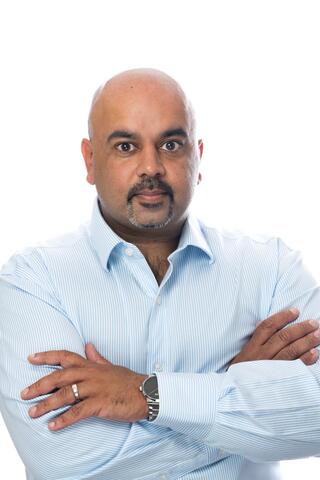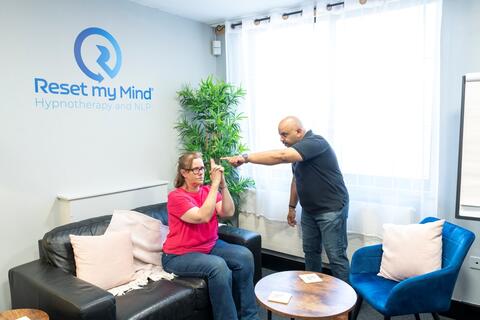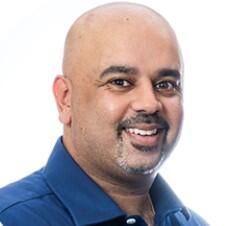
24 Sept 2025 ● Harmonia Careers
A Day in the Life of a Hypnotherapist with Rahul Jain

Today, we step into the daily life of dedicated clinical hypnotherapist & NLP Practitioner, Rahul Jain, whose world is equally shaped by family and professional practice.
From early mornings spent as a hands-on dad to afternoons filled with client sessions, preparation, and ongoing study, his day is a careful balance of personal and professional roles. With a strong commitment to his clients’ well-being, he adapts each session uniquely -whether working with children, adults, or online.
Beyond the therapy room, he continues to deepen his knowledge through workshops and collaborations with fellow practitioners. Here, he shares a candid glimpse into how he navigates the demands of his work, the joy of family life, and the ongoing journey of personal and professional growth.
How does your day typically begin? Do you have any routines that help you centre yourself before clients arrive?
My day starts firmly in dad mode – getting the kids up, sorting breakfast and packed lunches, and juggling two different school drop-offs. What should be a quick seven-minute drive from home to the office usually stretches into an hour.
But as soon as I step into the office, I switch gears. I’m no longer dad – I become whatever role is needed in that moment, in that space, for the people I’m working with.
As a family man, how do you balance your roles as a parent and hypnotherapist, and what does a normal weekday look like?
Yes, I’m very much a family man. My children are my source of energy, and I love being part of their day-to-day lives. I often shape my work around school drop-offs and pick-ups, with my wife and I coordinating the logistics depending on what our diaries look like. Some days that means leaving the office by 4pm, while on others I might stay until 7pm.
Alongside my hypnotherapy work, I’m still involved in other businesses, although those are largely self-managed. Hypnotherapy, on the other hand, demands more of my direct time and focus. Each session requires preparation, follow-up calls and emails, and I’m always studying and refining my techniques to stay at the top of my game.
What’s your routine for preparing mentally and emotionally for client sessions?
Because I conduct a very in-depth consultation before starting therapy with a client, I’m usually well prepared and mentally fairly relaxed when the session begins. Occasionally, I’ll take a few moments just to sit quietly, calm my mind, and let any personal concerns drift away for a while.
Before starting a session, I tell myself – either out loud or in my head – something along the lines of: “In this time and space, in this very moment, you are all that matters to me. I care about you, I want you to be well, and I am going to help you.” I sometimes even say this to the client, so they feel welcomed and safe to share what's on their mind.
At that point, I let everything else go. Nothing else matters except my client.

How do you tailor sessions to different clients throughout the day?
I know who I’ll be working with and usually have the session prepped to a point. That said, a session can never be fully prepped – anything can happen, and sometimes whatever I planned goes out the window the moment a client says something that needs immediate attention. As a highly skilled therapist, I know what to look for and how to adapt my approach in the moment.
Whether working online or in-person , the sessions are the same. My induction into hypnosis might change slightly, but the work itself – and the results – remain the same.
When I work with children, it depends a lot on their age, maturity and how open they are to therapy. I generally don’t do much prep work with kids because they can be unpredictable. The key is building rapport: being funny, friendly, and showing them some fascinating magic tricks. Once that connection is there, the therapy becomes much easier.
Can you share a standout moment from a day where two very different clients surprised you with their outcomes?
Too many standout moments come to mind to pick just a few, but to be completely honest, I’m rarely surprised by an outcome. I work with an 80/20 expectation – 80% of my clients achieve a positive result, while in 20% we may not reach the desired outcome.
I always remind my clients that nothing is guaranteed, but the success rate is high – in some cases, possibly even higher than that of medication or surgery.
What’s the busiest or most demanding part of your workday?
Often, the busiest part of the day is actually when it’s time to go home. I’ll suddenly realise there’s still prep work to do, emails to send, and clients to call back – so “home time” is never really home time!
How do you wind down after a session?
I consider myself to be very resilient. I hear some of the most challenging stories from clients, but I don’t get emotionally involved. Empathy and remaining non-judgemental are crucial, but I need to stay calm and clear-headed, focused on how I can help the person rather than feeling sorry for them.
Occasionally, I encounter clients who are resistant, even though they genuinely want to change – most often this happens at a subconscious level. That can be frustrating, but at the end of the day, I accept that they fall into the 20% for whom this modality may not be suited – and that’s just the reality of the work.
How do you continue your own development as a practitioner? Do you still attend training, retreats, or workshops?
Most certainly - and I think I always will. Every day I’m learning new techniques, approaches, and inductions. I love continuing to develop my skills, and it’s wonderful to connect with other therapists at workshops and retreats. We learn from each other, support each other, and mentor one another.
One of the nicest things about this industry, from my personal experience, is that it’s not about competition. We genuinely care about our clients and want the best for them. If a client comes to me but I feel someone else is better placed to help them, I’ll happily refer them on – always prioritising their needs and how they will most benefit.

Outside of your therapy work, what brings you joy or is something that recharges you?
Honestly, I don’t have much time for hobbies with a busy work schedule and family commitments, but I’m fortunate to find joy in both my work and my family – not everyone is lucky enough to be able to say that. I count my blessings every day.
If I had more time, I would spend more of it on music, something I grew up with and still love to this day.
Lastly, do you have any tips for others who want to work or train in this area?
Absolutely. Find a good training school where you’ll have direct contact with your trainers and classmates. My advice would be to avoid video training only and look for something interactive with live training – online or in person.
Also – practice, practice, and practice some more. You shouldn’t even think about charging clients until you know you can genuinely make a positive difference in their lives and have the clinical skills and experience to deliver real outcomes.
Remember – this is a business. Don’t expect to make lots of money just because you have a qualification. You need to invest in branding, marketing, networking, advertising, and setting up your business properly.
Put in the time and effort, believe in yourself, and keep your focus squarely on helping people - the financial outcomes will follow naturally. Success in this field isn’t about chasing money; it comes from building trust, reputation, and expertise.
Clients recognise and reward the practitioners who truly make a difference, and over time, that translates into a sustainable and rewarding career.
Curious to learn more about Rahul’s approach to hypnotherapy and the work he does with clients? Visit his website to explore his practice and philosophy in more depth.

About Rahul
Rahul is the founder of Reset my Mind, and a clinical hypnotherapist & NLP Practitioner based in Leicester. With a background in health, fitness, and sales, he combines over 300 hours of training with a compassionate, results-focused approach to help clients overcome issues like anxiety, trauma, and chronic pain. Rahul is passionate about empowering people to make meaningful, lasting changes in their lives.


